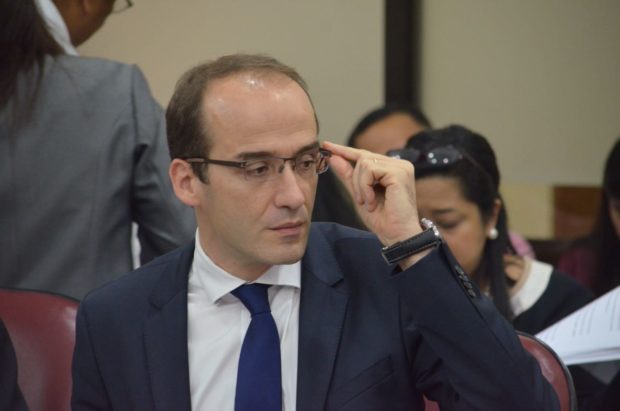Gov’t demands P1.4-B refund from Dengvaxia maker

Sanofi Pasteur representative Thomas Triomphe. NOY MORCOSO/INQUIRER.net
The government demanded a P1.4-billion refund from the French manufacturer of an antidengue vaccine a month after the Department of Health (DOH) suspended a massive immunization program due to its possible severe effects.
In a letter to Thomas Triomphe, head of Sanofi Pasteur Asia Pacific, the DOH said it wanted its money back for the remaining stock of Dengvaxia it is keeping in storage.
In a second letter to Triomphe, the DOH requested the pharmaceutical giant to conduct sero-testing of the more than 830,000 children who were vaccinated to determine who among them had previous exposure to the mosquito-borne virus.
The DOH said Sanofi should use “a newly developed test to determine their prevaccination status at no cost to the government.”
It also requested documents on all ongoing clinical trials and other studies involving Dengvaxia in the Philippines and sought “proof that they have passed ethics review standards of the Philippine Council for Health Research and Development.”
Article continues after this advertisementIn a statement on Friday, Health Secretary Francisco Duque III said Sanofi has not responded to the demand letters. He did not say when he sent the letters to Sanofi.
Article continues after this advertisement“The Dengvaxia vaccine which Sanofi Pasteur aggressively promoted and sold to the Philippine government has undeniably failed to deliver its supposed clinical benefit and safety claims, hence, considered defective under Philippine civil laws,” Duque said.
Duque suspended the P3.5-billion immunization program on Dec. 1 after Sanofi disclosed that Dengvaxia could cause severe dengue in those who had no prior infections.
In his statement, Duque also clarified that data from the DOH epidemiology bureau show “dengue shock as cause of death” in only four out of 17 children who had died after receiving Dengvaxia shots.
The deaths of the other children were due to other illnesses, he said.
A day earlier, he said there were 14 deaths and that “most” were due to dengue shock syndrome.
Duque stressed that there had been no determination that Dengvaxia was responsible for the deaths “because our experts are still studying the clinical records.”
In the City of San Fernando, capital of Pampanga province, health authorities on Friday said they were monitoring the condition of 171 children in Central Luzon who had been inoculated with Dengvaxia and recovering from various ailments, including one diagnosed with dengue.
One 12-year-old boy from Balanga, Bataan, who had received all three shots but was not among the 171, recently died of sepsis, or severe bacterial infection, said Dr. Leonita Gorgolon, DOH director for Central Luzon.
“[The boy from Bataan] tested negative for dengue and his platelet was normal,” Gorgolon, who is also DOH undersecretary for the Visayas, told the Inquirer.
The boy, Jaime Almoguerra, complained of headache and was taken to Bataan General Hospital where he died on Jan. 4. His mother, Annylin, wanted a deeper investigation to explain her son’s death.
One of the 171 being monitored by the health authorities, 11-year-old Ricky Cagungun of Masantol town in Pampanga, was admitted for dengue on Jan. 3 at Jose B. Lingad Memorial Hospital, Gorgolon said.
Gorgolon did not disclose the 11-year-old’s latest condition.
Central Luzon was one of the three regions where the vaccination program was piloted in 2016.
The DOH reported that 175,573 of the 205,058 students who were vaccinated in the region received all three doses.
The vaccination was done in 2,998 public elementary schools, 281 rural health units and health centers, 1,983 barangay health stations, 66 government medical centers, and 40 private hospitals. —WITH REPORTS FROM TONETTE OREJAS AND GREG REFRACCION